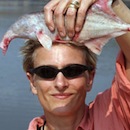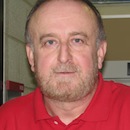Academic Editors
The following people constitute the Editorial Board of Academic Editors for PeerJ. These active academics are the Editors who seek peer reviewers, evaluate their responses, and make editorial decisions on each submission to the journal. Learn more about becoming an Editor.
Dirk Steinke
Dr. Dirk Steinke is an Adjunct Professor within the Department of Integrative Biology at the University of Guelph.
His research program focuses on various themes at the intersection of evolution, ecology and genomic science.
- Mitonuclear coevolution
- Coevolution of Complex IV in fishes
- Improved understanding of niche differentiation

Heidi Steltzer
Environmental scientist, explorer and science storyteller. She researchers how environmental changes affect mountain watersheds and the Arctic system, and their links to human well-being. She is an Associate Professor of Biology, Fort Lewis College. She is on the leadership team for Homeward Bound, an organization developing leadership for women in STEM. Founder of the Colorado Mountain Center. member American Geophysical Union.

David I Stern
David Stern is a professor in the Crawford School of Policy at The Australian National University and Director of the International and Development Economics Program. He is an energy and environmental economist, whose research focuses on the role of energy in growth and development and environmental impacts including climate change. He is also interested in research assessment. David is currently the chief investigator for an ARC Discovery Project on "Energy Efficiency Innovation, Diffusion and the Rebound Effect" and is one of six theme leaders for a UK Department for International Development funded project on electricity and economic growth in sub-Saharan Africa and South Asia. He was a lead author for the chapter on Drivers, Trends, and Mitigation in Working Group III’s contribution to the IPCC’s 5th Assessment Report. He was elected as a Fellow of the Academy of Social Sciences in Australia in 2016. He is an associate editor of Ecological Economics and on the editorial boards of Nature Energy and Open Economics and is a Fellow of the Academy of the Social Sciences in Australia.

Gavin B Stewart
Gavin is interested in applied research synthesis (combining scientific information to inform policy). Primary interests are meta-analysis and Bayesian belief networks. He has a deep mislike of P values much preferring effect sizes and confidence intervals, or better still probabilities of direct relevance to decision-making. Gavin's work on meta-analysis spans applied agriculture, food, rural development, ecology and medicine reflecting a belief in generic methods for Evidence Based X (EBX).
I am an elected member of the Society for Research Synthesis Methods and associate editor of its journal, Research Synthesis Methods. I am also associate editor for PeerJ and statistical editor for the Cochrane Pain and Palliative Care Group. I’m a member of the National Centre for Ecological Analysis and Synthesis Meta-analysis Working Group and co-author of the Handbook of Meta-analysis in ecology and evolution. I am also co-chair and editor of a new Campbell Collaboration Food Security group.

Melanie L.J. Stiassny
Axelrod Research Curator of Fishes, Division of Vertebrate Zoology, and Professor, Richard Gilder Graduate School at the American Museum of Natural History.

Tim Stinear
Professor Tim Stinear is a Senior NHMRC Research Fellow and molecular microbiologist in the Department of Microbiology and Immunology at the Doherty Institute for Infection and Immunity, University of Melbourne, Australia. He leads a bacterial pathogenesis research lab that focuses on using comparative and functional genomics to understand how certain bacteria evolve, spread and cause disease. In particular, his team studies pathogenic mycobacteria and hospital superbugs Staphylococcus aureus (Golden Staph) and Vancomycin Resistant Enterococci (VRE). He received his PhD in Microbiology from Monash University in 2001 followed by a 3-year postdoctoral period at the Institut Pasteur, Paris. He is a fellow of the Australian Society for Microbiology.
Ursula Stochaj
Associate Professor in the Department of Physiology at McGill University, Montreal.
Research interests: protein and RNA transport, nuclear function and organization, stress, signaling, chaperones, nanobiology, stem cell biology, microscopy, quantitative image analysis, high-throughput screening.

Hannes Stockinger
Head of the Center for Pathophysiology, Infectiology and Immunology at the Medical University of Vienna and Chairman of one of the Center’s subunit, the Institute for Hygiene and Applied Immunology, where he is appointed as a full professor for molecular immunology. Further, current Chairman of the Federation of Austrian Scientific Societies. Served as officer for many other national and international scientific organizations and societies. For instance, long-lasting Treasurer of the European Federation of Immunological Societies (EFIS, 2006-2015), President of the Austrian Society for Allergology and Immunology (2000-2006), Board Member of the Austrian Science Fund (2005-2014). Identified and developed targets for diagnosis and therapeutic treatment of immunological and inflammatory diseases particularly on T cells and myeloid cells by monoclonal antibodies. The latter have been distributed to the community and used by health care centers, doctors and researchers for the diagnosis and therapy of immunological diseases and leukemias already for decades. The contribution to the understanding of how GPI-anchored receptor proteins transduce signals across the plasma membrane were fundamental for the identification and characterization of lipid rafts, membrane devices that are now recognized to control signaling across the plasma membrane. Published more than 180 papers with an h-factor of 47.

Monika Stoll
Professor of Genetic Epidemiology at the Medical Faculty and Director of the Leibniz-Institute for Arteriosclerosis Research at the University of Muenster, Germany. Former Associate Editor of Physiological Genomics, Academic Editor of PLoS ONE. Main research interests: Genetics of complex disease traits, in particular cardiovascular and inflammatory diseases; comparative genomics, evolutionary medicine.

Maria Patrizia Stoppelli
Maria Patrizia Stoppelli is currently Research Director at Institute of Genetics and Biophysics, National Research Council, Naples (Italy). She has worked in prestigious Institutions like the NIH-NCI, Bethesda, Md and the MIT, Cambridge, MA and developed an internationally recognised research profile in tumour cell migration and invasion with over 65 publications and 2 patents to her name. In 2014, Dr Stoppelli qualified as Full professor in General and Clinical Biochemistry.

Kenneth B. Storey
My research focus is biochemical adaptation and my lab studies the gene, protein and enzyme mechanisms used for animal survival in harsh environments including hibernation, freezing survival, estivation and anoxia tolerance. My lab has explored these topics in >800 research papers, reviews and book chapters. I am a graduate of the University of Calgary (BSc 1971) and University of British Columbia (PhD 1974), a Fellow of the Royal Society of Canada and 2010 recipient of the RSC Flavelle medal.

Anne Marie Strohecker
Assistant Professor Departments of Cancer Biology and Genetics and Surgery, The Ohio State University
We are interested in mechanisms of autophagy regulation, with a focus on discovering how to modulate the pathway for optimal therapeutic benefit. Current projects are focused on the identification of novel autophagy regulators and their functional relevance for lung tumorigenesis

